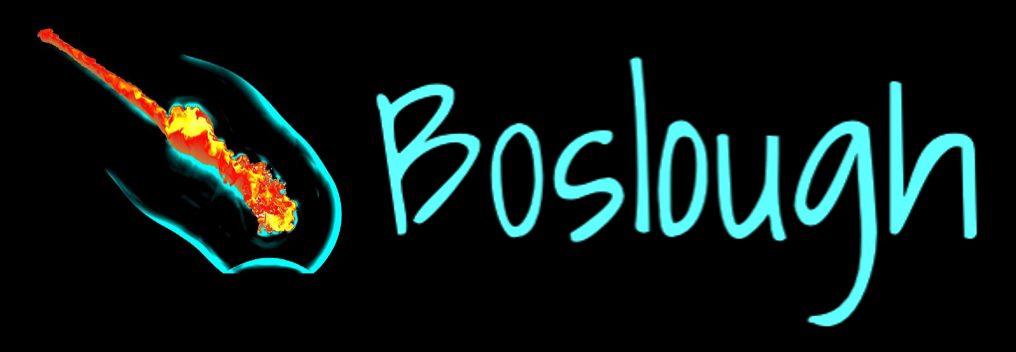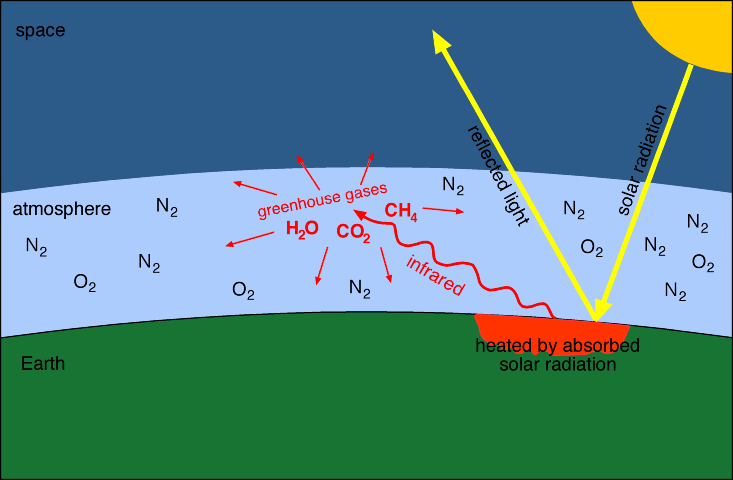The Right to Radiate
We each have the individual right to radiate, and if you block my photon with one of your carbon dioxide molecules, you owe me just compensation
One of the barriers to finding solutions to global warming is the insistence of political conservatives and libertarians that their right to burn as much fossil fuel as they want cannot be regulated. Since nobody "owns" the atmosphere, we have always treated it as an open sewer for our tailpipe and smokestack emissions. The sky seems infinite. Carbon dioxide is odorless and colorless. Who is it hurting, and what can they do about it? Would conservatives and libertarians have a different opinion if they understood physics and realized that their property rights were being taken without due process or just compensation?
Dr. Vic DiVenere, Columbia University
There is a strong conservative/liberal split in acceptance of the reality of human-caused global warming among the general population with limited levels of scientific literacy. But within the serious scientific community this political divide doesn't exist. There is overwhelming agreement among scientists of all ideological stripes that most, if not all, of the rapid heating is attributable to greenhouse gas pollution. Indeed, as many as 98% of the scientists who publish the most climate research have come to the same conclusion: the Earth is getting hotter and humans are the primary cause.
Members of my own scientific discipline -- physics -- are in strong agreement. The observational and theoretical groundwork for global warming predictions came from 19th-century giants in our field. According to our leading professional organization, the American Physical Society, "The evidence is incontrovertible: Global warming is occurring."
The most vocal denial of global warming physics comes from political pressure groups such as the Heartland Institute, which describes itself as a libertarian organization that promotes "free-market solutions." Their list of "global warming experts" includes a handful of physicists who don't like the APS "incontrovertible" statement, but tend to publish their objections in newspapers, not scientific journals.
Physics Today, our most widely circulated journal, recently published an article on the fundamental physical principles that cause global warming. The author, Prof. Raymond Pierrehumbert, describes how particles of radiant heat energy, called infrared photons, are blocked by carbon dioxide molecules and prevented from escaping to space. They heat up the air instead, and the warmer air sends some of the heat right back to the surface.
Our atmosphere has a natural cooling capacity that keeps our planet temperate and habitable. We are gumming it up with our pollution. It's as if we had an expensive car, and we were dumping wastewater into the radiator, and then ignoring the warning light that was telling us our engine is overheating.
Ironically, the legal theories of libertarian economist Murray Rothbard, a co-founder of the Cato Institute and coiner of its name, may hold the key. Rothbard was a proponent of the homestead principle, by which unowned resources -- like prairie wilderness, mineral riches, and the cooling capacity of the air above our heads -- can be privatized. If you use it for a prescribed period of time, you own it.
Rothbard argues, for example, that if a noisy airport is built far from any residential area, it "homesteads" the right to radiate loud sound waves across the surrounding vacant land. If a developer builds housing and the new residents complain about the noise, their right to "quiet enjoyment of the houses" is trumped by the airport's right to radiate noise.
According to Rothbard:
The airport, through homesteading, has earned an easement right to creating X decibels of noise. This homesteaded easement is an example of the ancient legal concept of "prescription," in which a certain activity earns a prescriptive property right to the person engaging in the action.
Generalizing the concept, Rothbard continues:
If A uses a certain amount of a resource, how much of that resource is to accrue to his ownership? Our answer is that he owns the technological unit of the resource. The size of that unit depends on the type of good or resource in question, and must be determined by judges, juries, or arbitrators who are expert in the particular resource or industry in question.
Presumably, physicists would be the experts called upon to help judges and juries determine rights to resources associated with the ability of the atmosphere to moderate our temperature.
Rothbard provides the legal basis for citizen lawsuits against carbon polluters. One of the physical consequences of being alive and being warm is that we emit heat in the form of infrared photons. As a physicist would say, we radiate. Our houses radiate, our pets radiate, our houses, farms, and trees radiate. That's what helps us and our stuff stay cool. Collectively, that what keeps our planet from overheating. But we don't have to consider anything collective or planetary. We each have the individual right to radiate, and if you block my photon with one of your carbon dioxide molecules, you owe me just compensation.
Nearly a quarter century ago I decided I didn't want four-wheelers driving across my Colorado property on an old mining road. I put some giant boulders in their way. One of their allies filed a lawsuit against me, claiming that the drivers had a prescriptive easement because they had been using the road for more than 20 years (the required period in Colorado). They were invoking the homestead principle, and were outraged in their belief that I was stealing something they owned. They knew they hadn't bought the road, but they had been using it. However, they couldn't provide evidence of 20 years of use, so my right to block their jeeps with my rocks was upheld in court.
Mark Boslough, Balarat Creek Wild Ranch, 2003
The right to radiate by all citizens has a much easier burden of proof. Our prescriptive easements consist of the gaps in the infrared absorption spectrum of the sky that are now being filled up by pollution. We've all been using them for our entire lives. And we can prove it in court if we can convince a judge that we've always had warm bodies, and get a physicist to be an expert witness. All we need are some real libertarians to work up some righteous indignation and file a lawsuit.
This essay originally appeared in the Huffington Post. Mark Boslough is a Fellow of the Committee for Skeptical Inquiry


